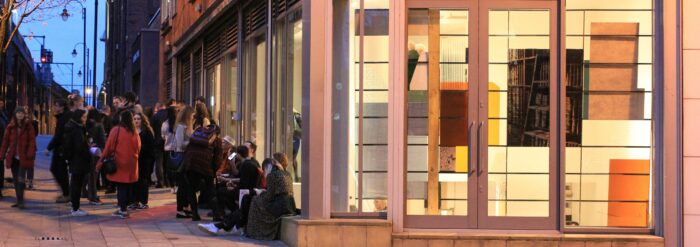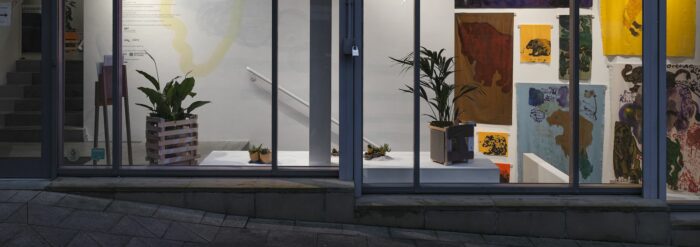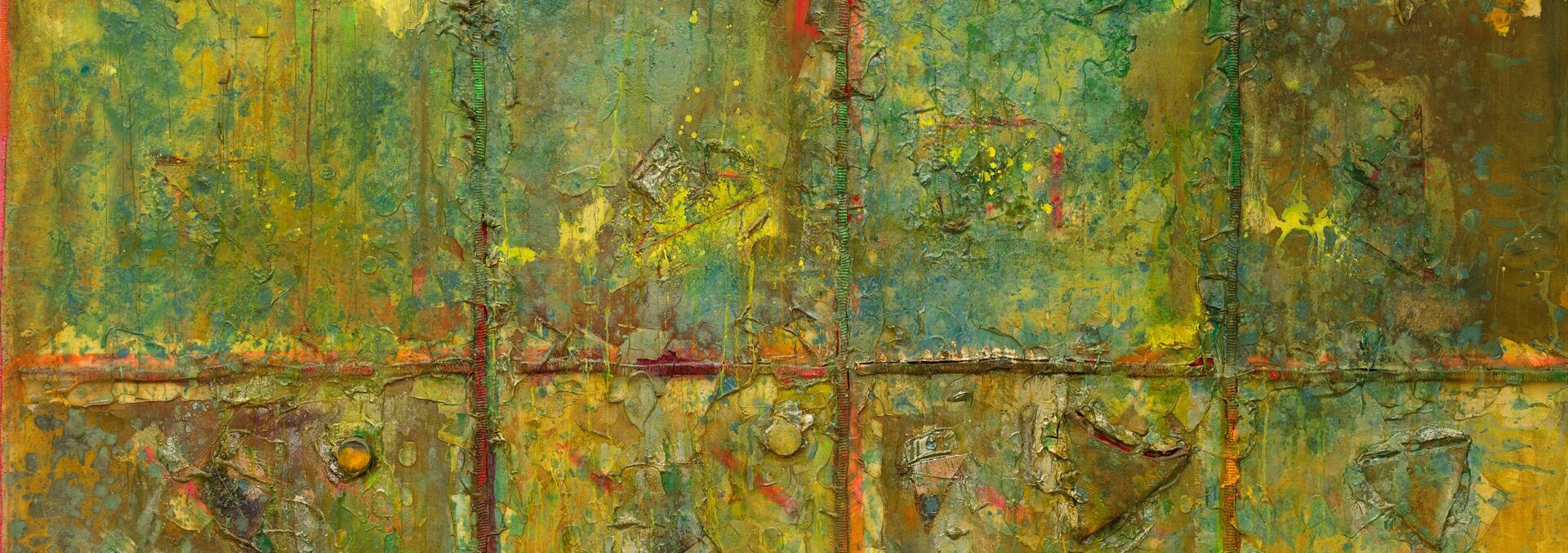
40 Years of the Future: Jo McGonigal x Frank Bowling
Exhibition
40 Years of the Future: Jo McGonigal x Frank Bowling
20 October 2024 - 02 February 2025
Castlefield Gallery
Housed in Castlefield Gallery’s distinct architect-designed interior, this dynamic exhibition will bring together site-specific ‘spatial paintings’ by Jo McGonigal with paintings and sculptures by Sir Frank Bowling OBE RA.
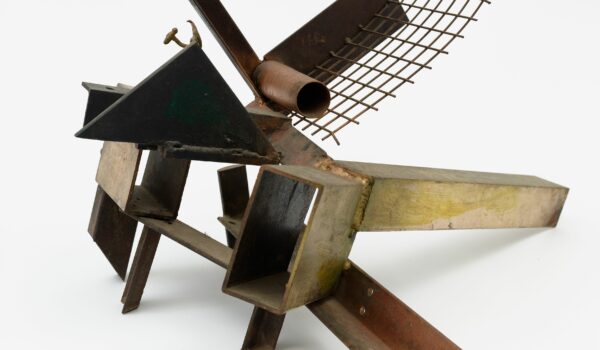
Each artist’s practice has a highly imaginative and unconventional engagement with pictorial and physical space. As an exhibition 40 Years of the Future: Jo McGonigal x Frank Bowling will explore new ways of thinking about the relationship between painting, sculpture and architecture.
In his book Frank Bowling: Sculpture (2022), writer and curator Sam Cornish shares a story of Bowling receiving an invitation from Castlefield Gallery in the 1980s to exhibit his paintings alongside the work of a contemporary sculptor. As a response, Bowling provided the sculptures himself. This led to a solo exhibition of Bowling’s paintings, works on paper and sculpture at the gallery in 1988. Bowling made a series of welded steel sculptures largely put together from the by-products of an engineering firm next to his studio. Like his paintings, the sculptures have multiple influences, playfully mixing references from high modernism, classical African sculpture, cubism and Russian constructivism. Except for a tour of this work at the time, the public has rarely had access to Bowling’s sculptures since.
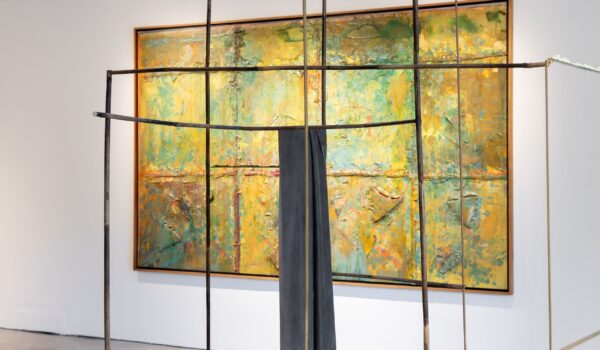
40 Years of the Future: Jo McGonigal x Frank Bowling will offer a unique opportunity to experience Bowling’s sculptures. Encountering these pieces alongside his paintings will encourage exploration of the sculptural elements throughout his work. This includes the density of acrylic gel built up on their surfaces, his monolithic ‘poured’ paintings, and Bowling’s particular use of the marouflage technique and objects he collages into his works.
McGonigal’s paintings leave the constraints of the canvas behind, to interact directly with the environment in which her works are placed. McGonigal is interested in the interaction between painting and architecture as well as deconstructing the internal architecture of painting itself. Recent works involve applying layers of traditional gesso, normally used to prime canvases, directly on to the gallery walls before introducing lines of coloured chalk, piles of pigment geometric structures, textile and archaeological elements into formal abstract compositions. McGonigal combines these elements to enable a visual and sensory engagement with the tactile, spatial, durational and imaginative capacities of painting that activate the body as much as the eye.
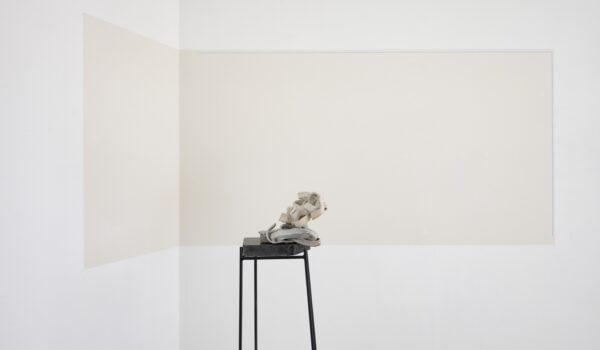
Bowling’s interest in geometry is evident from the use of grids, spirals and other shapes defining space in his paintings and sculptures. This is not only a visual device, but it also speaks to universal laws of nature and form. McGonigal’s use of traditional materials such as gesso (prepared using animal glue and marble dust), gritstone and chalk introduces into the gallery space material that has been produced over long periods of geological or deep time. Gesso is the unseen substrate below the surface, presented here as the subterranean level of painting, which contains invisible natural sediments. McGonigal is physically taking painting apart and separating its surfaces to bring the viewer closer to painting’s elemental relationship with the physical world.
As Castlefield Gallery celebrates 40 years it gives us great pleasure to present works featured in the 1988 exhibition (Frank Bowling, 10 June – 23 July 1988) alongside more recent works by Bowling and new works by McGonigal. This exhibition enables us to continue to develop conversations around how we understand the mediums and techniques of painting and sculpture, and to demonstrate how one practice can enrich and influence the other.
Watch
Jo McGonigal and Ben Bowling from Frank Bowling Studio introduce the exhibition in this video filmed and edited by Jules Lister.
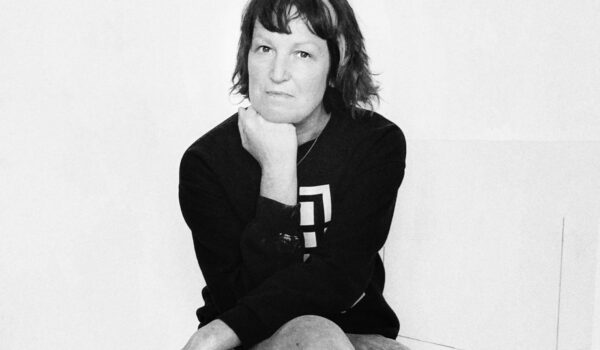
ABOUT JO MCGONIGAL
Jo McGonigal is a UK artist and Fine Art lecturer in the School of Fine Art, History of Art & Cultural Studies at the University of Leeds. McGonigal has gallery representation with Patricia Fleming Gallery, Glasgow, co-curator of Real Painting, Castlefield Gallery; Eccentric Geometric, Arthouse1 and has participated in numerous exhibitions including: Blinder, Patricia Fleming Projects Glasgow, 2019; Contemporary British Painting 2019; Hard Painting, Phoenix Gallery Brighton 2020; Come and Go. Halt Extreme Left, Winchester Art Gallery, 2019. McGonigal is also part of the London based art collective: Outside Architecture.
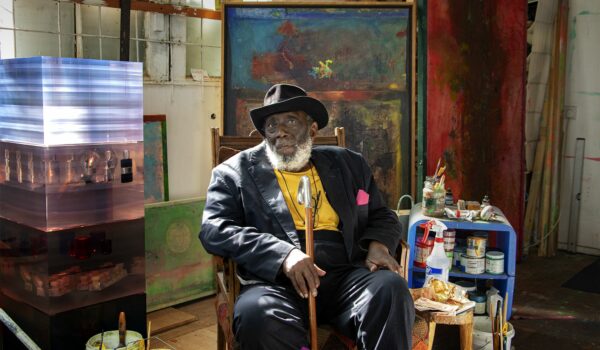
ABOUT SIR FRANK BOWLING OBE RA
Born in Guyana (then British Guiana) in 1934, Sir Frank Bowling OBE RA arrived in London in 1953, graduating from the Royal College of Art with the silver medal for painting in 1962. By the early 1960s, he was recognised as an original force in London’s art scene with a style combining figurative, symbolic and abstract elements. After moving to New York in 1966, Bowling’s commitment to modernism meant he was increasingly focused on material, process and colour, so that by 1971 he had abandoned the use of figurative imagery. Bowling became a Royal Academician in 2005 and was awarded the OBE for services to Art in 2008 and a knighthood in the Queen’s Birthday Honours in 2020. In 2022, he was awarded the Wolfgang Hahn Prize which honours exceptional contemporary artists. His work is represented in fifty collections worldwide and has been exhibited widely, including the 2017-19 touring exhibition Mappa Mundi, the hugely successful retrospective at Tate Britain in 2019 and the major solo presentation Frank Bowling’s Americas at Museum of Fine Arts in Boston 2022, which travelled to San Francisco Museum of Modern Art (SFMOMA) in May 2023.
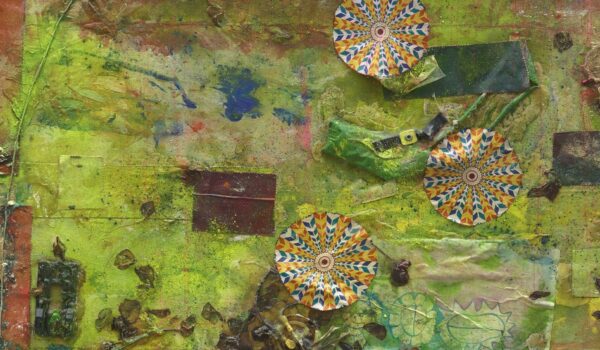
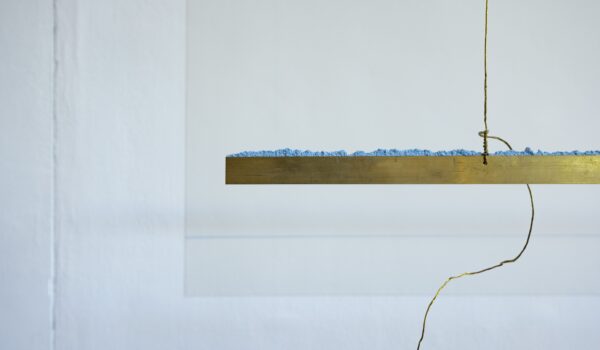
SUPPORTERS
This exhibition is generously supported by the Henry Moore Foundation and the University of Leeds.

A special thank you to Ben Bowling, Frank Bowling, Sam Cornish, Griselda Pollock and Susi Sahmland.
IMAGES
Banner:
- Frank Bowling, Sasha’s Green Bag, 1988, Acrylic, acrylic gel, polyurethane foam and found objects on canvas with marouflage, 180.6 x 294.2 cm. © Frank Bowling, All Rights Reserved, DACS 2022. Courtesy the artist. Photographed by Anna Arca.
From left to right, top to bottom:
- Frank Bowling, Bulbul, 1988, Detail, Welded steel. © Frank Bowling, All Rights Reserved, DACS 2022. Courtesy the artist. Photographed by Anna Arca.
- Jo McGonigal, Lie Still in the Stress of that Storm (2024) and Frank Bowling, Sasha’s Green Bag (1988). Photographed by Jules Lister.
- Jo McGonigal, Old Earth, 2024. Photographed by Simon Pantling.
- In Conversation: Ben Bowling and Jo McGonigal at Castlefield Gallery, photographed by Iqra Saied.
- Jo McGonigal, courtesy of the artist.
- Sir Frank Bowling, 2020, Photo by Sacha Bowling, courtesy the artist
- Frank Bowling, Mummybelli, 2019, Detail, Acrylic, acrylic gel and found objects on collaged canvas with marouflage, 171.3 x 206.8 cm. © Frank Bowling, All Rights Reserved, DACS 2022. Courtesy the artist. Photographed by Anna Arca.
Jo McGonigal, Act Seven: Paler, Blinder, 2019 at the University of Leeds. Photographed by Jules Lister. - Jo McGonigal, As Far as the Eye Can See, 2024. Photographed by Simon Pantling.
Downloads
Press release
363.9296875kbExhibition guide
4017.3818359375kbPlan
5838.6083984375kbHandout
5577.380859375kb